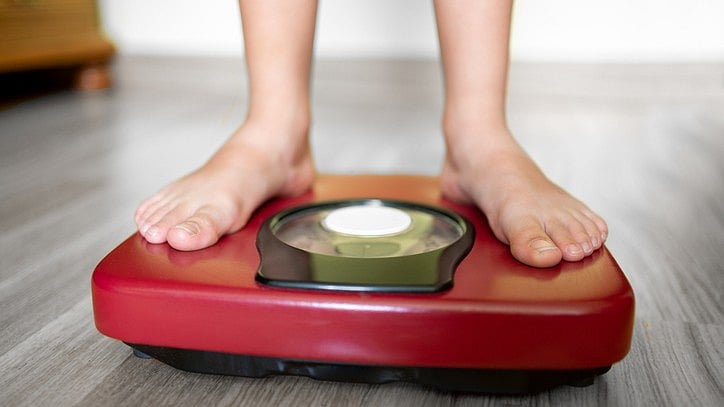
Patients on the 6 mg dose of the Lilly drug lost 7.8% of their weight. (Representative image)
Credit: iStock Photo
Eli Lilly said on Thursday that its experimental GLP-1 pill helped patients lose 12.4% of their body weight after 72 weeks in a late-stage study, less than previous trial results for Novo Nordisk's injectable obesity treatment Wegovy.
Lilly shares were down 6.7% in premarket trading as the data failed to meet the high bar set by investors. US-listed shares of Novo were up about 8%.
"The goal was to create an oral pill that was convenient and can be made at huge scale, really, for the mass market, and had weight loss that was competitive with other single-acting GLP-1s. And that's what we've achieved," Lilly CEO David Ricks said on CNBC. "The key question all along wasn't, were we going to have 12.4 or 13.5% weight loss? The key question all along was, is it safe enough?" said Ricks, whose comments appeared to calm investors who had initially sent Lilly shares down around 14%.
He added that the company hopes the drug can start to get approvals around the world at this time next year.
Unlike injectable obesity drugs, which are peptides designed to mimic the appetite-controlling GLP-1 hormone, orforglipron is a small molecule pill that is easier to manufacture and package, said Kenneth Custer, president of Lilly's cardiometabolic health division.
Lilly, whose injectable GLP-1 Zepbound competes directly with Wegovy, views the once-daily pill as a promising alternative to injections that could be used for early intervention and long-term disease management, Custer said.
Patient preference also leans toward oral medications over injections. Several studies have shown that a significant portion of patients prefer pills due to convenience and a dislike of needles.
"We have pretty big aspirations for how many patients orforglipron could help," he said of the once-daily pill.
In the over 3,000-person study of overweight or obese adults with weight-related health issues, but not diabetes, those who received the highest 36-milligram dose of orforglipron on average shed 12.4% of their weight versus 0.9% for those who received a placebo.
Patients on the 6 mg dose of the Lilly drug lost 7.8% of their weight.
After early trial results, expectations were high for the drug to do better than Novo's Wegovy, said Barclays analyst Emily Field. "It's worse than Wegovy, so it's a shock."
The rate of nausea for high-dose patients was 33.7%, while 24% experienced vomiting, compared with 10.4% and 3.5%, respectively, for the placebo group.
'BEST CASE SCENARIO FOR NOVO'
At least two analysts said the tolerability profile of orforglipron was not as good as what was seen in a trial that tested the drug on diabetes patients.
While we still see this as manageable, "rates of nausea and vomiting may be higher than investor expectations," BMO Capital Markets analyst Evan Seigerman said.
Just over 10% of the high-dose patients dropped out of the trial due to adverse side effects. No liver safety issues were seen, Lilly said.
At least three analysts said the market had been looking for orforglipron to match Wegovy's 14.9% weight loss over 68 weeks, as shown in a 2021 trial, with some expecting the pill to surpass Novo's popular drug.
Novo and Lilly shareholder Markus Manns called the results a best case scenario for Novo. "The competitive threat from Lilly is suddenly much weaker than anticipated."
Zepbound and Wegovy currently dominate the weight-loss market, which some analysts expect to reach $150 billion by the early 2030s.
The US Food and Drug Administration is reviewing a high-dose oral version of Wegovy for potential approval later this year. Novo said it helped overweight or obese adults lose 15% of their body weight in a late-stage trial.
Lilly said orforglipron also lowered markers of heart disease risk, including cholesterol, triglycerides, and blood pressure, across all doses.
Wegovy has been approved to reduce the risk of major heart problems, and Lilly last week released data showing the heart-protective qualities of diabetes treatment Mounjaro, which has the same main ingredient as Zepbound. Heart disease approvals would greatly enhance the likelihood of insurance coverage for weight-loss drugs.
The company announced earlier this year that a Phase 3 study found that type 2 diabetes patients lost nearly 8% of their body weight after 40 weeks on orforglipron.
Lilly has said it has begun manufacturing the drug in order to stockpile supply ahead of a commercial launch, which should help avoid shortages experienced when early demand for the injectables far outstripped supply.
The full results from the Lilly-backed trial will be presented next month at a major European diabetes meeting, the Indianapolis-based drugmaker said.